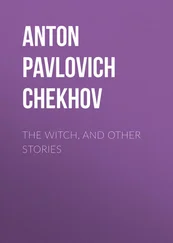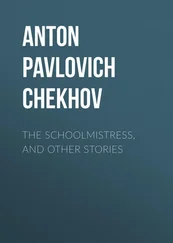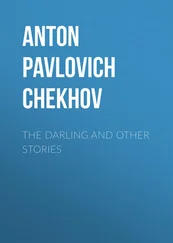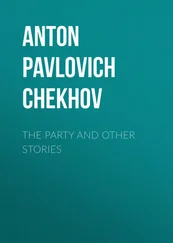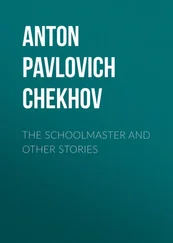Anton Chekhov - The Bishop and Other Stories
Здесь есть возможность читать онлайн «Anton Chekhov - The Bishop and Other Stories» весь текст электронной книги совершенно бесплатно (целиком полную версию без сокращений). В некоторых случаях можно слушать аудио, скачать через торрент в формате fb2 и присутствует краткое содержание. Жанр: Классическая проза, на английском языке. Описание произведения, (предисловие) а так же отзывы посетителей доступны на портале библиотеки ЛибКат.
- Название:The Bishop and Other Stories
- Автор:
- Жанр:
- Год:неизвестен
- ISBN:нет данных
- Рейтинг книги:3 / 5. Голосов: 1
-
Избранное:Добавить в избранное
- Отзывы:
-
Ваша оценка:
- 60
- 1
- 2
- 3
- 4
- 5
The Bishop and Other Stories: краткое содержание, описание и аннотация
Предлагаем к чтению аннотацию, описание, краткое содержание или предисловие (зависит от того, что написал сам автор книги «The Bishop and Other Stories»). Если вы не нашли необходимую информацию о книге — напишите в комментариях, мы постараемся отыскать её.
The Bishop and Other Stories — читать онлайн бесплатно полную книгу (весь текст) целиком
Ниже представлен текст книги, разбитый по страницам. Система сохранения места последней прочитанной страницы, позволяет с удобством читать онлайн бесплатно книгу «The Bishop and Other Stories», без необходимости каждый раз заново искать на чём Вы остановились. Поставьте закладку, и сможете в любой момент перейти на страницу, на которой закончили чтение.
Интервал:
Закладка:
When the procession was getting near the Monastery, I noticed Alexandr Ivanitch among the elect. He was standing in front of them all, and, his mouth wide open with pleasure and his right eyebrow cocked up, was gazing at the procession. His face was beaming; probably at such moments, when there were so many people round him and it was so bright, he was satisfied with himself, his new religion, and his conscience.
When a little later we were sitting in our room, drinking tea, he still beamed with satisfaction; his face showed that he was satisfied both with the tea and with me, that he fully appreciated my being an intellectual, but that he would know how to play his part with credit if any intellectual topic turned up. . . .
"Tell me, what psychology ought I to read?" he began an intellectual conversation, wrinkling up his nose.
"Why, what do you want it for?"
"One cannot be a teacher without a knowledge of psychology. Before teaching a boy I ought to understand his soul."
I told him that psychology alone would not be enough to make one understand a boy's soul, and moreover psychology for a teacher who had not yet mastered the technical methods of instruction in reading, writing, and arithmetic would be a luxury as superfluous as the higher mathematics. He readily agreed with me, and began describing how hard and responsible was the task of a teacher, how hard it was to eradicate in the boy the habitual tendency to evil and superstition, to make him think honestly and independently, to instil into him true religion, the ideas of personal dignity, of freedom, and so on. In answer to this I said something to him. He agreed again. He agreed very readily, in fact. Obviously his brain had not a very firm grasp of all these "intellectual subjects."
Up to the time of my departure we strolled together about the Monastery, whiling away the long hot day. He never left my side a minute; whether he had taken a fancy to me or was afraid of solitude, God only knows! I remember we sat together under a clump of yellow acacia in one of the little gardens that are scattered on the mountain side.
"I am leaving here in a fortnight," he said; "it is high time."
"Are you going on foot?"
"From here to Slavyansk I shall walk, then by railway to Nikitovka; from Nikitovka the Donets line branches off, and along that branch line I shall walk as far as Hatsepetovka, and there a railway guard, I know, will help me on my way."
I thought of the bare, deserted steppe between Nikitovka and
Hatsepetovka, and pictured to myself Alexandr Ivanitch striding
along it, with his doubts, his homesickness, and his fear of solitude
. . . . He read boredom in my face, and sighed.
"And my sister must be married by now," he said, thinking aloud, and at once, to shake off melancholy thoughts, pointed to the top of the rock and said:
"From that mountain one can see Izyum."
As we were walking up the mountain he had a little misfortune. I suppose he stumbled, for he slit his cotton trousers and tore the sole of his shoe.
"Tss!" he said, frowning as he took off a shoe and exposed a bare foot without a stocking. "How unpleasant! . . . That's a complication, you know, which . . . Yes!"
Turning the shoe over and over before his eyes, as though unable to believe that the sole was ruined for ever, he spent a long time frowning, sighing, and clicking with his tongue.
I had in my trunk a pair of boots, old but fashionable, with pointed toes and laces. I had brought them with me in case of need, and only wore them in wet weather. When we got back to our room I made up a phrase as diplomatic as I could and offered him these boots. He accepted them and said with dignity:
"I should thank you, but I know that you consider thanks a convention."
He was pleased as a child with the pointed toes and the laces, and even changed his plans.
"Now I shall go to Novotcherkassk in a week, and not in a fortnight," he said, thinking aloud. "In shoes like these I shall not be ashamed to show myself to my godfather. I was not going away from here just because I hadn't any decent clothes. . . ."
When the coachman was carrying out my trunk, a lay brother with a good ironical face came in to sweep out the room. Alexandr Ivanitch seemed flustered and embarrassed and asked him timidly:
"Am I to stay here or go somewhere else?"
He could not make up his mind to occupy a whole room to himself, and evidently by now was feeling ashamed of living at the expense of the Monastery. He was very reluctant to part from me; to put off being lonely as long as possible, he asked leave to see me on my way.
The road from the Monastery, which had been excavated at the cost of no little labour in the chalk mountain, moved upwards, going almost like a spiral round the mountain, over roots and under sullen overhanging pines. . . .
The Donets was the first to vanish from our sight, after it the Monastery yard with its thousands of people, and then the green roofs. . . . Since I was mounting upwards everything seemed vanishing into a pit. The cross on the church, burnished by the rays of the setting sun, gleamed brightly in the abyss and vanished. Nothing was left but the oaks, the pines, and the white road. But then our carriage came out on a level country, and that was all left below and behind us. Alexandr Ivanitch jumped out and, smiling mournfully, glanced at me for the last time with his childish eyes, and vanished from me for ever. . . .
The impressions of the Holy Mountains had already become memories, and I saw something new: the level plain, the whitish-brown distance, the way side copse, and beyond it a windmill which stood with out moving, and seemed bored at not being allowed to wave its sails because it was a holiday.
THE STEPPE
The Story of a Journey
I
EARLY one morning in July a shabby covered chaise, one of those antediluvian chaises without springs in which no one travels in Russia nowadays, except merchant's clerks, dealers and the less well-to-do among priests, drove out of N., the principal town of the province of Z., and rumbled noisily along the posting-track. It rattled and creaked at every movement; the pail, hanging on behind, chimed in gruffly, and from these sounds alone and from the wretched rags of leather hanging loose about its peeling body one could judge of its decrepit age and readiness to drop to pieces.
Two of the inhabitants of N. were sitting in the chaise; they were a merchant of N. called Ivan Ivanitch Kuzmitchov, a man with a shaven face wearing glasses and a straw hat, more like a government clerk than a merchant, and Father Christopher Sireysky, the priest of the Church of St. Nikolay at N., a little old man with long hair, in a grey canvas cassock, a wide-brimmed top-hat and a coloured embroidered girdle. The former was absorbed in thought, and kept tossing his head to shake off drowsiness; in his countenance an habitual business-like reserve was struggling with the genial expression of a man who has just said good-bye to his relatives and has had a good drink at parting. The latter gazed with moist eyes wonderingly at God's world, and his smile was so broad that it seemed to embrace even the brim of his hat; his face was red and looked frozen. Both of them, Father Christopher as well as Kuzmitchov, were going to sell wool. At parting with their families they had just eaten heartily of pastry puffs and cream, and although it was so early in the morning had had a glass or two. . . . Both were in the best of humours.
Apart from the two persons described above and the coachman Deniska, who lashed the pair of frisky bay horses, there was another figure in the chaise-a boy of nine with a sunburnt face, wet with tears. This was Yegorushka, Kuzmitchov's nephew. With the sanction of his uncle and the blessing of Father Christopher, he was now on his way to go to school. His mother, Olga Ivanovna, the widow of a collegiate secretary, and Kuzmitchov's sister, who was fond of educated people and refined society, had entreated her brother to take Yegorushka with him when he went to sell wool and to put him to school; and now the boy was sitting on the box beside the coachman Deniska, holding on to his elbow to keep from falling off, and dancing up and down like a kettle on the hob, with no notion where he was going or what he was going for. The rapid motion through the air blew out his red shirt like a balloon on his back and made his new hat with a peacock's feather in it, like a coachman's, keep slipping on to the back of his head. He felt himself an intensely unfortunate person, and had an inclination to cry.
Читать дальшеИнтервал:
Закладка:
Похожие книги на «The Bishop and Other Stories»
Представляем Вашему вниманию похожие книги на «The Bishop and Other Stories» списком для выбора. Мы отобрали схожую по названию и смыслу литературу в надежде предоставить читателям больше вариантов отыскать новые, интересные, ещё непрочитанные произведения.
Обсуждение, отзывы о книге «The Bishop and Other Stories» и просто собственные мнения читателей. Оставьте ваши комментарии, напишите, что Вы думаете о произведении, его смысле или главных героях. Укажите что конкретно понравилось, а что нет, и почему Вы так считаете.





